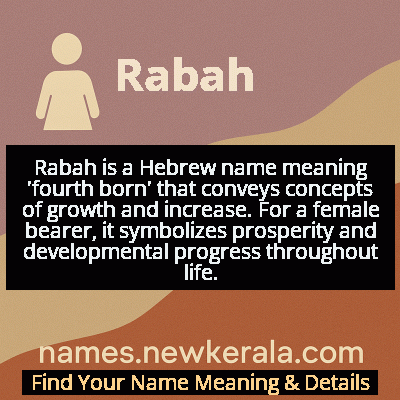Rabah Name Meaning & Details
Origin, Popularity, Numerology Analysis & Name Meaning of Rabah
Discover the origin, meaning, and cultural significance of the name RABAH. Delve into its historical roots and explore the lasting impact it has had on communities and traditions.
Name
Rabah
Gender
Female
Origin
Hebrew
Lucky Number
3
Meaning of the Name - Rabah
Rabah is a Hebrew name meaning 'fourth born' that conveys concepts of growth and increase. For a female bearer, it symbolizes prosperity and developmental progress throughout life.
Rabah - Complete Numerology Analysis
Your Numerology Number
Based on Pythagorean Numerology System
Ruling Planet
Jupiter
Positive Nature
Optimistic, inspirational, and creative.
Negative Traits
Scattered, exaggerating.
Lucky Colours
Yellow, gold, purple.
Lucky Days
Thursday.
Lucky Stones
Yellow sapphire.
Harmony Numbers
1, 2, 9.
Best Suited Professions
Arts, writing, communication.
What People Like About You
Creativity, optimism.
Famous People Named Rabah
Rabah Bitat
Political Leader
Algerian revolutionary and interim President of Algeria
Rabah Madjer
Football Player
Algerian football legend and national team captain
Rabah Saâdane
Football Coach
Renowned Algerian football manager
Rabah Yousif
Athlete
British-Sudanese sprinter and Olympic competitor
Name Variations & International Equivalents
Click on blue names to explore their detailed meanings. Gray names with will be available soon.
Cultural & Historical Significance
In North African and Middle Eastern cultures, particularly in Algeria and surrounding regions, Rabah has been embraced as a unisex name with strong cultural roots. The name appears in various historical contexts, from political leaders to cultural figures, demonstrating its enduring appeal across generations. Its cross-cultural adaptability makes it a bridge between different linguistic and ethnic communities, representing shared values of growth and prosperity.
The name's journey through different cultures illustrates how traditional names can maintain their core meanings while adapting to modern sensibilities. This cultural resilience makes Rabah a meaningful choice for families seeking to honor heritage while embracing contemporary identity expressions.
Extended Personality Analysis
Individuals named Rabah are often characterized by their growth-oriented mindset and resilient nature. They typically exhibit strong leadership qualities combined with practical wisdom, making them natural problem-solvers in both personal and professional contexts. Their name's meaning of 'increase' often manifests in their approach to life as continuous learners who seek to expand their knowledge and experiences.
Rabahs tend to be nurturing yet determined, balancing compassion with strength of character. They often demonstrate remarkable adaptability to changing circumstances, much like the concept of growth embedded in their name. Their personality frequently includes a blend of traditional values and progressive thinking, allowing them to honor their heritage while embracing modern perspectives.
This combination makes them effective mediators and community builders. They typically possess an innate understanding of how to help others grow and develop, often serving as mentors or guides. Their presence tends to inspire progress and positive change in their environments, living up to the prosperous connotations of their name.
Modern Usage & Popularity
In contemporary times, Rabah maintains steady usage in North African and Middle Eastern communities, particularly in Algeria, Morocco, and surrounding regions. While traditionally more common for males, the feminine form has gained popularity in recent decades as naming conventions evolve. The name experiences periodic resurgences, often influenced by cultural figures and historical anniversaries. Its cross-cultural appeal makes it a choice for parents seeking a name that honors heritage while remaining distinctive in multicultural societies. Digital globalization has also contributed to its recognition beyond traditional geographic boundaries, with diaspora communities helping to spread its usage to Europe and North America while maintaining its cultural significance.
Symbolic & Spiritual Meanings
Symbolically, Rabah represents concepts of growth, abundance, and progressive development. The name embodies the metaphorical journey from small beginnings to significant achievements, mirroring natural processes of cultivation and harvest. It symbolizes not just physical growth but intellectual and spiritual expansion, representing the human capacity for continuous improvement and adaptation. The name carries connotations of fertility and prosperity, making it associated with blessings and positive transformation in various cultural contexts. This symbolic richness connects the name to universal human aspirations for development and fulfillment across different life domains.

